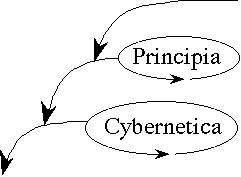

 http://pespmc1.vub.ac.be/NUTSHELL.html (PC Press Internet CD, 03/1996)
http://pespmc1.vub.ac.be/NUTSHELL.html (PC Press Internet CD, 03/1996)
 | | PRINCIPIA CYBERNETICA WEB | - | © |
|
|
Author: F. Heylighen, C. Joslyn, V. Turchin,
Date : Sep 19, 1995 (modified); Aug 1991 (created)
Parent Node(s):
An Overview of the Principia Cybernetica project
The present document proposes a highly condensed view of the goals, results and organization of the Principia Cybernetica Project, mainly for people who already have an idea of what this is all about. For more background and motivation, check the Introduction and the project's History. For a comprehensive list of available material, check the Table of Contents, or Index.
 The Principia Cybernetica Project (PCP) is a collaborative, computer-supported attempt to develop a complete cybernetic and evolutionary philosophy. Such a philosophical system should arise from a transdisciplinary unification and foundation of the domain of Systems Theory and Cybernetics. Similar to the metamathematical character of Whitehead and Russell's "Principia Mathematica", PCP is metacybernetical: cybernetic tools and methods are used to analyze and develop cybernetic theory.
The Principia Cybernetica Project (PCP) is a collaborative, computer-supported attempt to develop a complete cybernetic and evolutionary philosophy. Such a philosophical system should arise from a transdisciplinary unification and foundation of the domain of Systems Theory and Cybernetics. Similar to the metamathematical character of Whitehead and Russell's "Principia Mathematica", PCP is metacybernetical: cybernetic tools and methods are used to analyze and develop cybernetic theory.
Tools
These include the computer-based tools of hypertext, electronic mailing lists, electronic publishing (FTP and WWW servers), and knowledge structuring software. They are meant to support the process of collaborative theory-building by a variety of collaborators, with different backgrounds and living in different parts of the world, as summarized in the list of specific goals for PCP. PCP will thus naturally develop in the cyberspace of interlinked electronic networks, as implemented in the World Wide Web distributed hypermedia environment.
Structure
PCP is to be developed as a dynamic, multi-dimensional conceptual network. The basic architecture consists of nodes, containing expositions and definitions of concepts, connected by links, representing the associations that exist between the concepts. Both nodes and links can belong to different types, expressing different semantic and practical categories, organized according to a unified format.
Subject
As its name implies, PCP will focus on the clarification of fundamental concepts and principles of the broadly defined domain of cybernetics and systems. This includes related disciplines such as the "sciences of complexity", AI, ALife, Cognitive Science, Evolutionary Systems, and Memetics. Concepts include: Complexity, Information, Entropy, System, Freedom, Control, Self-organization, Emergence, etc. Principles are for example Natural Selection, "the whole is more than the sum of its parts", and the laws of Requisite Variety, of Requisite Hierarchy, and of Regulatory Models. See a provisional list of primitive concepts in the form of a semantic network.
Philosophy
The PCP philosophical system is to be seen as a clearly thought out and well-formulated, global "world view", integrating the different domains of knowledge and experience. It should provide an answer to the basic questions: "Who am I? Where do I come from? Where am I going to?". An introductory overview of some of the basic concepts of our philosophy can be found in Turchin's long paper in TeX format "A Dialogue on Metasystem Transition".
The PCP philosophy, which we call "Metasystem Transition Theory", is systemic and evolutionary, based on the spontaneous emergence of higher levels of organization or control (metasystem transitions) through blind variation and natural selection. It includes:
- a metaphysics, based on processes or actions as ontological primitives,
- an epistemology, which understands knowledge as constructed by the subject or group, but undergoing selection by the environment;
- an ethics, with survival and the continuance of the process of evolution as supreme values.
Philosophy and implementation of PCP are united by their common framework based on cybernetic and evolutionary principles: the computer-support system is intended to monitor and amplify the spontaneous development of knowledge which forms the main theme of the philosophy.
PCP is a world-wide organization, with many collaborators, managed by a board of editors (presently V. Turchin (CUNY, New
York), C. Joslyn (NASA) and F. Heylighen (Free Univ. of Brussels)). Contributors are kept informed and participate in discussions through the PCP-news and PRNCYB-L electronic mailing lists. Further activities of PCP are publications in journals or books, and the organization of meetings or symposia. Almost all information gathered by PCP is available either by anonymous ftp at ftp.vub.ac.be, directory /pub/projects/Principia_Cybernetica, or on the World-Wide Web at http://pespmc1.vub.ac.be. An up-to-date summary can be requested by email to PCP@vnet3.vub.ac.be.
Child Nodes:
URL= http://pespmc1.vub.ac.be/NUTSHELL.html



 http://pespmc1.vub.ac.be/NUTSHELL.html (PC Press Internet CD, 03/1996)
http://pespmc1.vub.ac.be/NUTSHELL.html (PC Press Internet CD, 03/1996)
